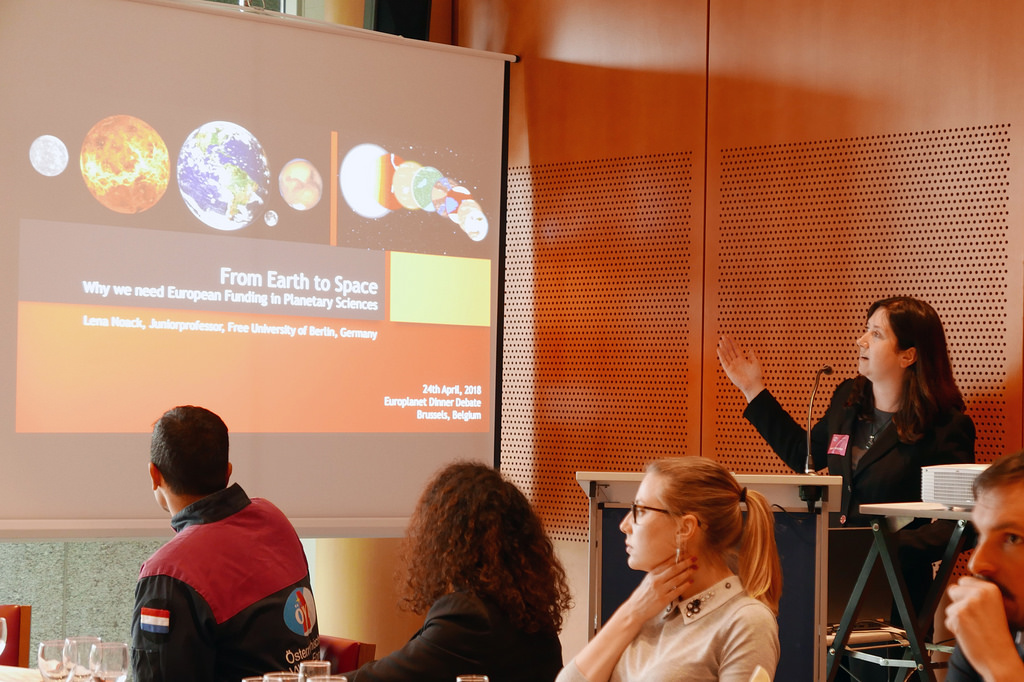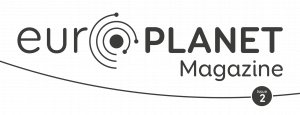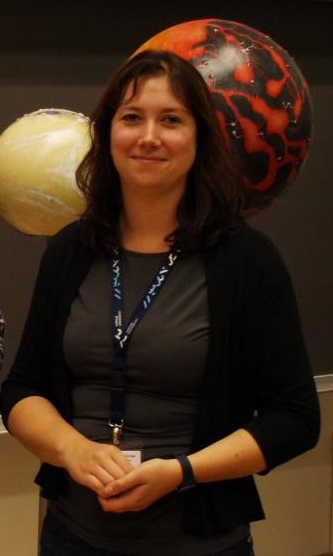Planetary Perspectives – Lena Noack
Prof Lena Noack is a planetary scientist in the Department of Earth Sciences at the Freie Universität Berlin. Her research focuses on geodynamics and mineral physics of planetary processes. She is Incoming Chair of the Europlanet Science Congress (EPSC) Executive Committee, Vice-Chair of the Europlanet Diversity Committee, a founding Member of the Europlanet Early Career (EPEC) Network and joint winner of the 2021 Farinella Prize.
Read article in the fully formatted PDF of the Europlanet Magazine.
How have you reached your current job position?
I started my scientific career in Berlin, my home town, as a doctoral student at the German Aerospace Center. When I learned a few years ago, during my postdoctoral phase at the Royal Observatory of Belgium, that there was a position available for a junior professor at the Freie Universität Berlin to study planetary processes, it seemed like a perfect match. It was a tough competition, and I am still very happy that the committee decided to hire me.
Just a few months ago I was promoted to a regular university professor, and I am looking forward to continuing to work in a city that combines so many different aspects of planetary sciences. It is an exciting place to work! Recently a colleague of mine hinted that one of the reasons that they made me an offer four years ago was because of my interest in committee and administrative work.
At that time I was already engaged in two Astrobiology networks (EANA and AbGradE) as well as Europlanet (EPEC and diversity activities), so being involved in these networks was an important stepping stone for my career!
Who or what are your inspirations?
What drives and motivates me and my research is my scientific curiosity. If there is something that I do not understand, or that is not well-known, I want to learn more, even if I have to work for years to find out about the topic. When I finished university, I thought that the time of learning would be over, but instead I realised that there are so many more exciting things to discover and to learn, especially if you work with different disciplines, or if you work in a rather young field, as is the case for exoplanets. The first confirmed exoplanet detection around a sun-like star happened only about 25 years ago, and the first rocky planets were discovered just when I started my PhD. So there is still lots to do, and I know that my scientific curiosity will probably never be saturated. There is so much more to do and discover!
What have we learned about the interiors of terrestrial planets in our Solar System by studying exoplanets?
One of the most important facts that we have learned about the terrestrial planets in our Solar System is, in my opinion, that they are the exception rather than the rule. Our classical view of how a planetary system should look (rocky planets close to the star, gaseous or icy bodies further out) was shaken-up quite a bit in the last two decades. But what is perhaps more important for me is that we have gained a much deeper understanding of how the interior processes inside a rocky planet influence its surface conditions. We have learned that the habitability of Earth may depend on the fact that our planet is not a more massive ‘super-Earth’. We are also lucky that our star is not much more massive (in which case it would be short-lived) or less massive (in which case it would destroy our atmosphere with solar flares). We seem to be at a sweet spot here, for both planet and star, and it should not be expected that every rocky planet that experiences moderate surface temperatures will evolve into a habitable planet. Of course, for now, many of these predictions come solely from computer models. But the better-able we are able to study atmospheres of exoplanets (and the launch of the James Webb Space Telescope will be a big step in this direction), the better we can confirm or adapt our current understanding of planetary interiors.
You’ve been involved in almost every aspect of the Europlanet Society’s activities. How did you first become involved?

In the beginning, I only knew about the EPSC, and did not know for some time that Europlanet was behind this great conference. It was at the Europlanet General Assemblies during EPSC that I learned about the research infrastructure and the added value of connecting different institutes across national borders. And since I was living in Brussels, I was soon asked by Europlanet if I would be interested in assisting at meetings that Europlanet organised at the European Commission and the European Parliament. This was a very exciting experience for me, to get in direct contact with such important stakeholders, and to learn about their point of view. And then one thing followed the next, being asked to set up the Early Career Network (which then became EPEC), getting involved in the Diversity Committee, and becoming a member of the Scientific, Local and Virtual Organising Committees and now Executive Committee for EPSC.
What main actions would you like to see implemented to increase diversity and widen participation in the planetary community?
In my experience, one of the best approaches to widen participation with respect to any aspect of diversity (gender, age, cultural background, nationality, LGTBQ+, etc) is to create role models. At conferences, this means adding diversity to the committees, convenership, and, as a result, to the solicited speakers. Another avenue, which Europlanet has already followed for a long time, is to offer bursaries to groups that may otherwise not have appropriate funding. This is one of the most important actions to make sure that no participant is excluded due to financial means. What I would very much like to see is hosting a future EPSC in one of the countries represented in the Europlanet Central Hub, where travel budgets are typically more limited than in Western Europe, and which might then result in a more even spread of participants from all parts of Europe. We are actually starting now to look for a potential host for EPSC 2025 – the call will be out soon!
What has most surprised you about how EPEC has developed over the last five years?
I am immensely impressed with how strong EPEC has grown and how continuously it brings together the early career community in planetary sciences in Europe – even during the pandemic. In the beginning, we started with some loose ideas of how EPEC could work, and
were completely overrun by the enthusiasm of so many early career professionals. It took a while to set EPEC up, starting from some first brainstorming ideas with different Europlanet Board members, and acting as a head-hunter to find several representatives of different institutes and networks to become involved. When the first official EPEC activities started in 2017 in Riga, I was actually already hired as professor and was therefore no longer an early-career scientist myself, so it seemed wrong to keep chairing the EPEC activities. We were extremely lucky to immediately find active members for EPEC, and of course Indhu Varatharajan as an excellent Chair of EPEC, who really invested a lot of her time to keep EPEC growing from 2017-2021. Without dedicated people leading EPEC, and specifically the different working groups, the story of this network may have ended shortly after its launch. Instead, it is becoming larger every year, and with the two new Co-chairs, Erica Luzzi and Ines Belgacem, it will have a bright future for many years to come.
What are you most looking forward to in your new role as Chair of EPSC?
Helping to organise EPSC in the past at different levels has been a rewarding challenge, and it is exciting to change now my role to Incoming Chair of EPSC. Apart from finding a great venue for EPSC 2025, I look forward to strengthening the collaboration with DPS in the joint meeting in 2023, and I am really excited that we will finally have the chance to visit both Grenada and Helsinki in 2022 and 2024 respectively and that we did not miss hosting an EPSC at these great locations due to the pandemic. EPSC has been constantly growing over the past years, but I specifically look forward to contributing to making it as inclusive and diverse as possible, to truly represent the planetary sciences community within the whole of Europe. At the same time, I think it is important to keep the ‘family feeling’ of the Europlanet Society and EPEC at EPSC, so that participants have a rewarding experience when attending our annual conference. With approximately 1000 participants each year, we are now at a comfortable size for EPSC, where we can all experience the newest scientific discoveries and breakthroughs, but still have the chance to meet and exchange with our colleagues without feeling lost, something we definitely want to keep for the future, especially after the cut-backs during the pandemic!



